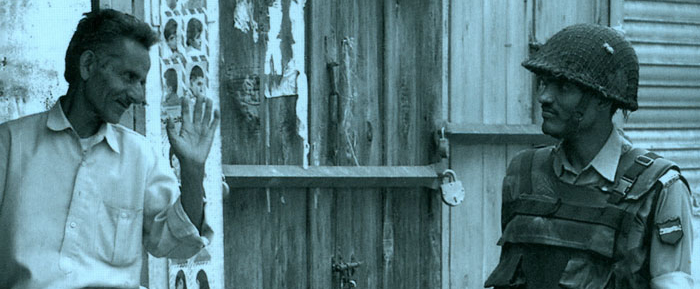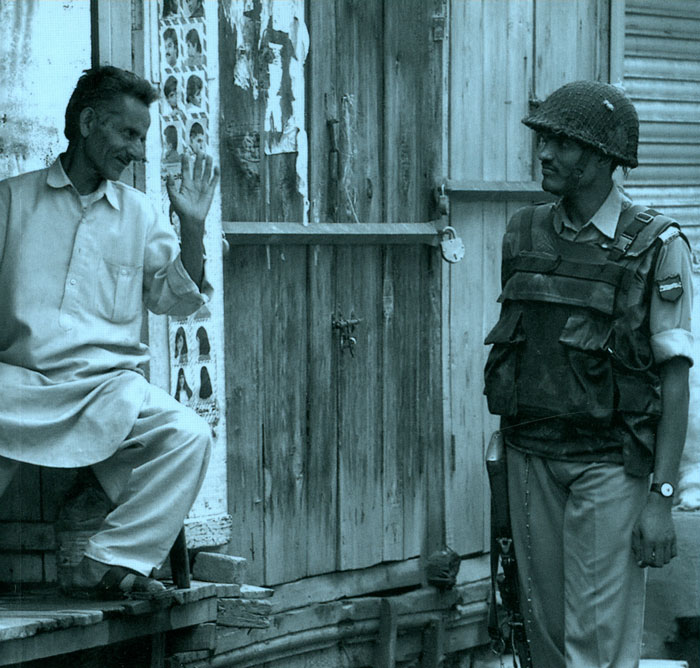Ideology Performed:
Official Ideologies, State Apparatuses, the world we live in
Ömür Harmansah ~ September 17, 2007 ~ Blue State cafe.
As you can see, I love fancy titles: once you start with a grandiose one, they set the bar really high, and now you are in trouble: totally responsible for constructing an equally ambitious piece of writing to match the title. A challenge. But there is always the possibility of miserably failing. Isn't this the way academic research operates though? We write glorious dissertation proposals, grant applications, book prospectuses and end up being obliged to do it. All is very serendipitous I must say. Let's get serious.
May I start by pointing to the little bits of hints that I have gathered about the performative nature of ideology? Going through my ten pages of hand written notes, I saw that the most enthusiastically written pieces (in caps and with color ink) are the sections on the performance of ideological discourse in the programmatic presentation of official ideologies and our everyday lived experiences. Since we have not explicitly covered the issue in our discussion but occasionally referred to it, I though it might be helpful to organize my thoughts on it in writing. Going through last year's Architecture Body Performance seminar, I also found the response piece I had produced there on the project of modernity and its colonization of the human body, and the René Burri photograph I had posted there. This gave me a bit more intuition. In the beginning of that seminar, we had discussed the project of modernity as the disciplining of the human body (also note Tom's reference to the modernist stance of Marxist theories of ideology), and that discussion, now I see, would have benefited from a quick Althusser reading on the ideological state apparatuses.
I was particularly intrigued by Althusser's discussion of education as an ideological state apparatus, the most dangerous one he seems to imply, because it is "silent". Education provides the indoctrination of society rather comprehensively about the official ideologies of the state. This is particularly effective in the way we are taught how to become good subjects (the "hailing" or the "interpellation" of the subject: the always performing of the 180 degree turn to the Police's Call), or rather, how to perform being good citizens. I have experienced this quite heavily in my primary school to high school education at the very heart of a modernist nation-state (See e.g. Salmoni 2004), starting every day by shouting at the top of our voice a memorized "Citizen's Promise" (Turk. Andimiz) that started with the phrase "I am a Turk, I am hardworking, I am righteous, my law is to protect the younger ones, respect the elder... etc" and ending the week with the national anthem. In Physical education classes, we would spend most of the time learning military walking skills, we had actually a class called "National Security and Knowledge of Citizenship". As we memorized the names of the Hittite kings by heart in history classes (Suppuliluima- I knew about him extensively at the age of 12), we were convinced that they were our true ancestors, unlike the despotic Ottoman Sultans. I experienced perhaps one the most violent transitions of my life when I stepped into my first year of architecture school at METU, being thrown from the hands of the conservative but secularist education system to a cutting edge ultra-leftist college. I was saved.

In any case, this is NOT to argue along the lines of the most widespread fallacy about ideology, i.e ideology is something practiced by the state only. I hope we all agreed on the much broader definitions of ideology such as "the material processes of production of ideas, beliefs and values in social life... a whole complex of signifying practices and symbolic processes... lived experiences of various social actors." (Eagleton 28-29); most frequently as a collective symbolic self-expression of a group, a worldview of sorts, that present a performative discourse in the public sphere, often in conflictive or relational circumstances, almost always, discursively or non-discursively relating to relations of power. This I think is a useful definition that avoids associating ideology exclusively with the dominant calsses, ruling elite or the state, but opens door to the distribution of agency to different social actors and groups. It also denies that ideology is not an illusory discourse that operates by creating false consciousness: it is a social reality, a material process, a lived experience with concrete, physical manifestations. I would add that all dominant ideologies (ruling elite, state, etc) are not single-handedly produced discourses that are consciously directed towards achieving particular interests, but they are literally social products, they emanate from the micro-practices and much smaller scale ideologies and trends in the social world. In this sense, ideology distinguishes itself from propaganda, since the agency behind it is distributed and it is only possible when it operates as a successful communication. Also important to note that ideology is usually a narrativizing discourse (more on this later this semester) presenting alternative versions for the collective understandings of the past, i.e. frequently attempt to shape the collective memory. This is performed through a naturalizing and universalizing tone of voice as a rhetorical and material device. This inevitably touches to all (social?) processes of our constitution as social subjects (identity, memory, gender, history, spatiality, etc).
This can, I believe, give us a clue into the urgent question on how ideology is a useful term for archaeological research. If there has been a rise of interest among archaeologists on how societies viewed their own past (an how we understand ours), then I think it is timely to speak about ideology in a critical discourse. Even if it is only a resistance to the apoliticized view of the world forced down the throats of our generation... A fascinting area of discussion is the writing of the archaeological history of today's nation states, while we understand "writing of history" as an ideological gesture, a performance, as Michel de Certeau talks about it.
Performativity of ideology was briefly touched by Eagleton (19) with the suggestion that ideology "belongs to the class of speech acts which get something done.. rather than to the discourse of description". This alone throws a lethal blow at all discussions of ideological discourse that is fixated on the epistemic falsehood. This surely is connected to Althusser's well-balanced interest in ideology as "lived relations" and that ideology has to do with real contacts with the real world. This will bring me back to education as an ideological state apparatus. It is indeed very fascinating to see how the official ideology is almost always "performed", presented to the public in the form of spectacles and never just spoken about. I was always impressed what I read in the memoirs of one of my favourite poets, Ece Ayhan, who wrote that in his childhood, when he was a primary school student (which should correspond to late 30s in Turkey), they were taken as a class to the public executions of prisoners, and he was always puzzed by the fact that they were required to take their notebooks, rulers and pencils to these occasions.
Perhaps the most important material manifestations of ideology are then those spectacles that occupy the public sphere. Spectacles and social event are fascinating because they cannot exist without participation: its raison d'etre is the public. Demarrais et al's discussion of ceremonies, symbolic objects, monuments and writing systems are interesting in this sense, despite they glaringly fall in the most common trap of the scholarship on ideology: they assume that ideology belongs to the world of the state and the ruling elite, while anything outside the dominating discourse are limitingly marginalized as "resistance". Consider for instance the institutionalization of the language of Sumerian in Early Mesopotamia. We now know pretty much safely that a multiplicity of languages and dialects were spoken in Early Mesopotamia at the time of the invention of writing. But the ruling elite elected to write in Sumerian tha most probably acted as an ideologically discursive act that marginalized other languages. An anthropological/archaeological approach to the linguistic make-up of early Mesopotamian world that is informed by critical theories of ideology then could be very helpful in raising new research questions in this field. This not only raises questions of representation of various cultural aspects of early Mesopotamia, but also puts royal inscriptions or even the economic documents of the public sphere under new light.
 Image: Frontispiece of A. Sharma and A. Gupta (ed.), The anthropology of the state: a reader. Blackwell 2006.
Image: Frontispiece of A. Sharma and A. Gupta (ed.), The anthropology of the state: a reader. Blackwell 2006.
